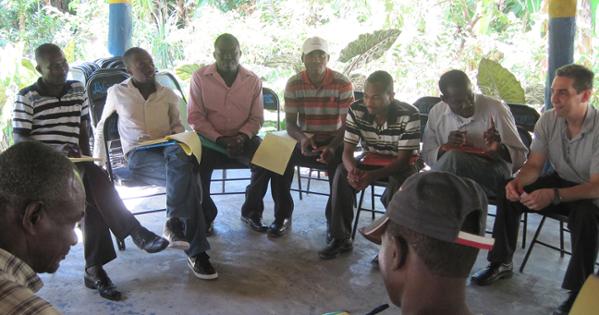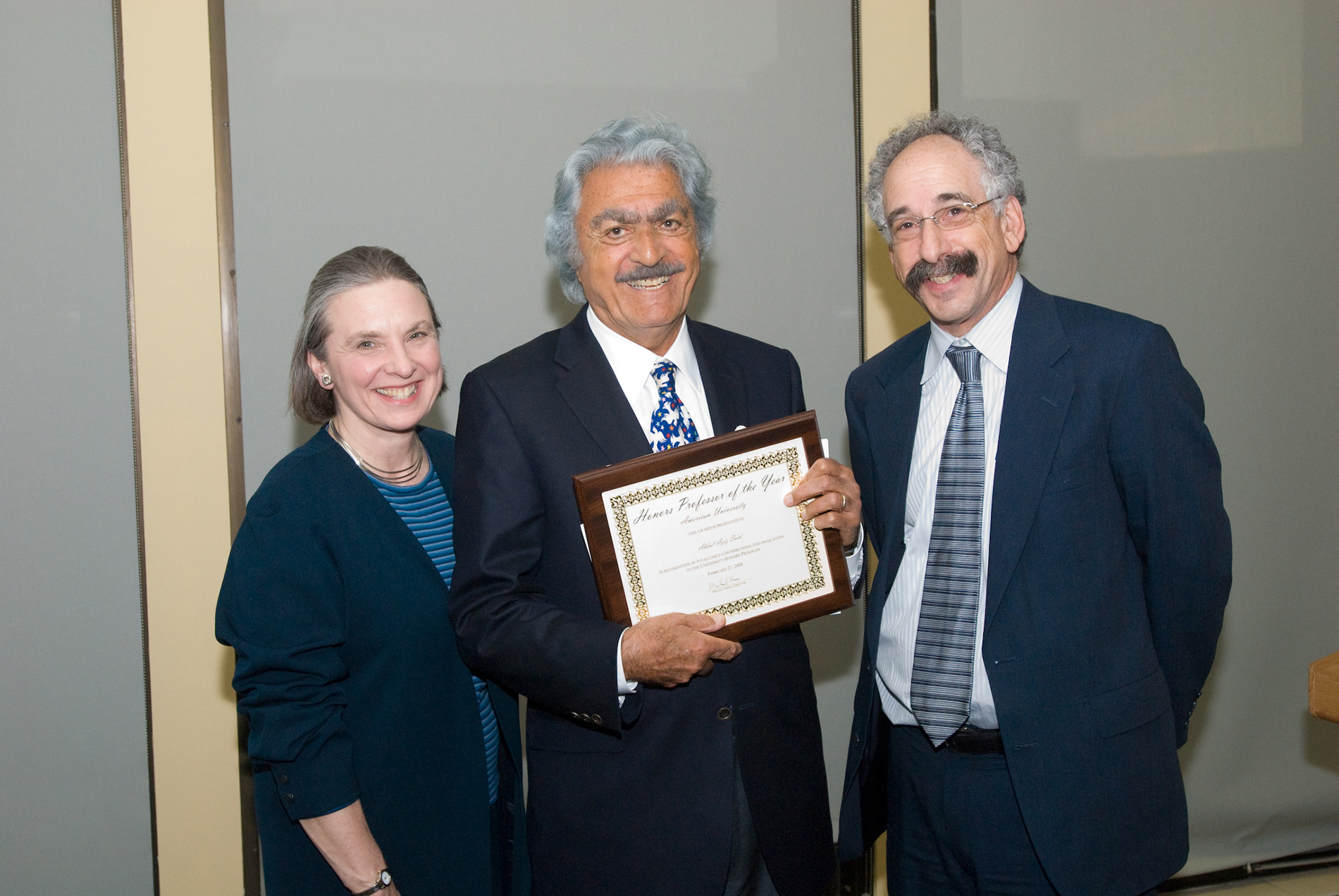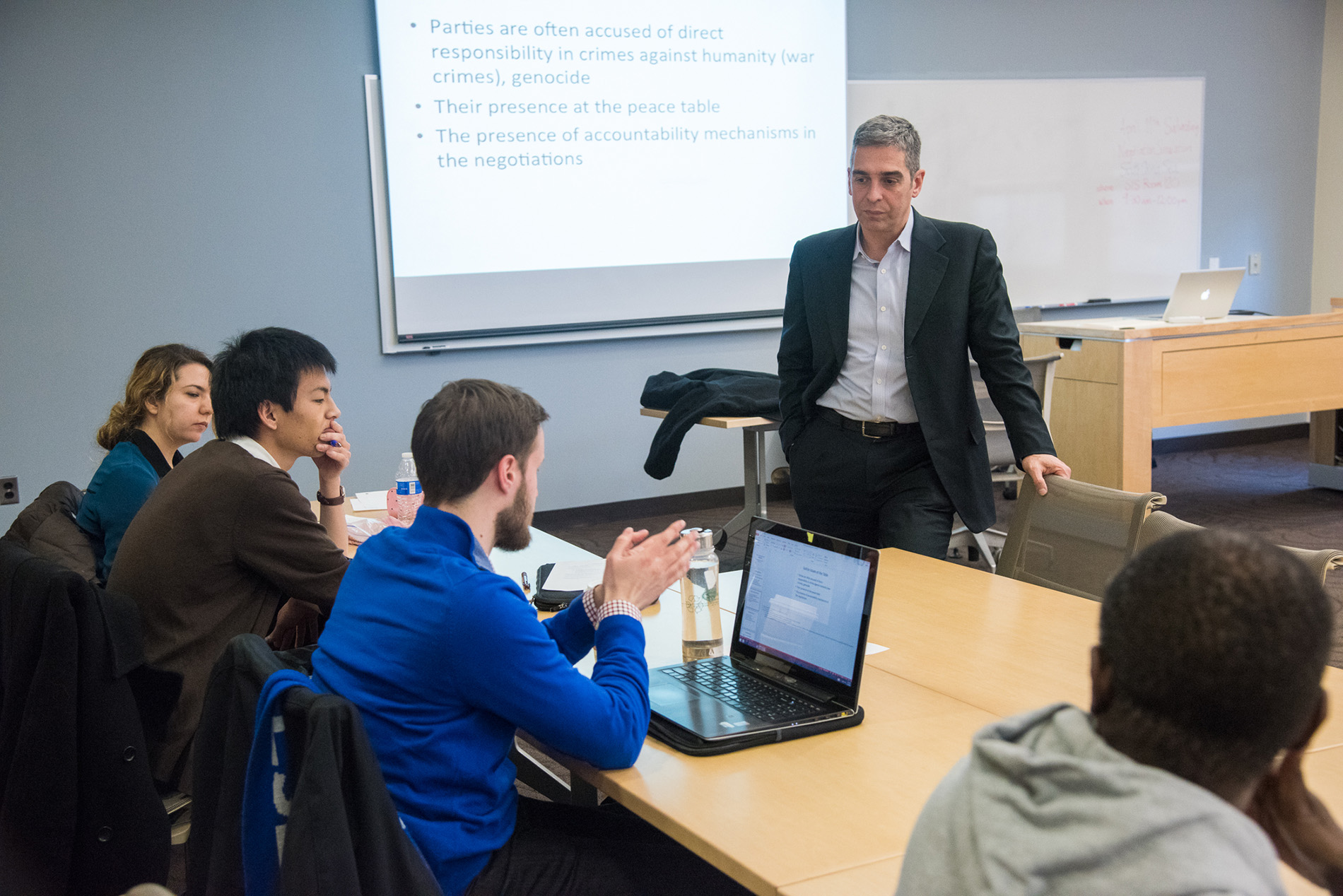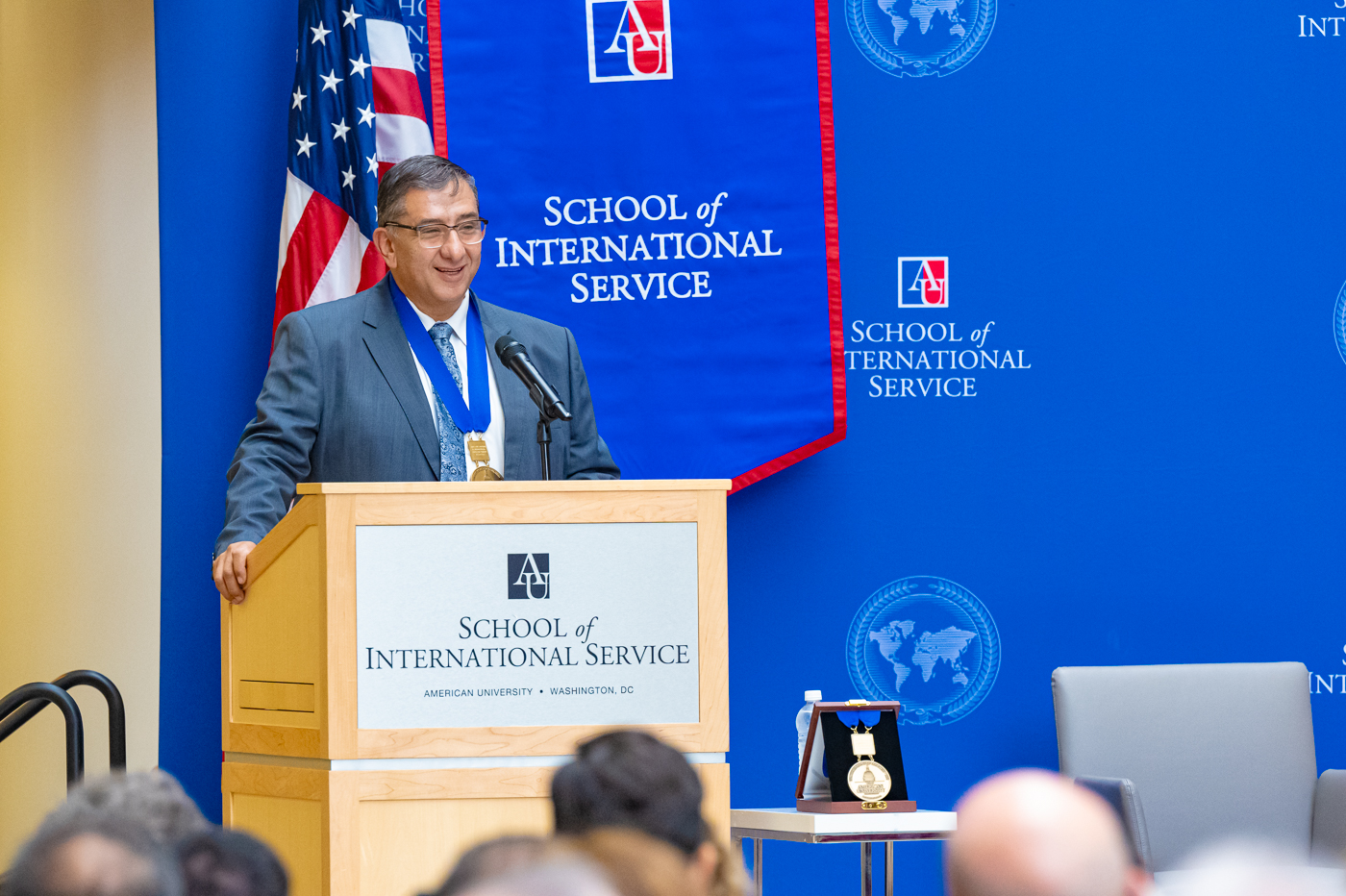MA in International Peace and Conflict Resolution Celebrates 30 Years

More than half a century ago, as resistance to the Vietnam War spawned protest movements and demonstrations across college campuses, a growing hunger among scholars and students for peace and conflict resolution studies became apparent.
As threats to global peace persisted, American University’s School of International Service responded by introducing a conflict resolution curriculum in the 1960s. Then, in 1995, SIS launched the master’s in International Peace and Conflict Resolution (IPCR), a program dedicated to training students with professional skills in peacebuilding and conflict resolution.
This fall, SIS is celebrating 30 years of the IPCR program. Over the past three decades, IPCR has made positive impacts worldwide through alumni working toward peace in myriad ways, including in conflict zones and post-war states. Today, the IPCR program continues to echo the spirit of SIS’s founding charge to “wage peace” by preparing graduates with meaningful skills in conflict mitigation and reconciliation.
The Early Days
Founded by the late Professor Abdul Aziz Said in 1995, the IPCR program came to fruition at the behest of American University students who pressed the university to offer a full degree program in peace and conflict resolution. In his final interview with SIS before his passing in 2021, Said emphasized the collective effort behind the program’s creation.
“Although my name is associated with founding the program, it is really the result of collaborative efforts of faculty and students,” Said reflected. “Otherwise, it wouldn’t have been there.”

In its infancy, the program was built upon bridging theory with practice by “taking the theory of peace and conflict resolution from the classroom to the community,” said SIS professor Mohammed Abu-Nimer. Abu-Nimer, the inaugural Abdul Aziz Said Chair in International Peace and Conflict Resolution, was the first full-time faculty member hired by Said in the early years of the program. Together, Said and Abu-Nimer worked to create a practical foundation for the program and a sense of community among students enrolled in IPCR.
“Working together with Professor Said, we launched and continued strengthening the program around creating a connected community among the students and faculty in the program who saw some kind of a calling and really believed in the nonviolence and peace building not only as a profession but saw it as a reason for their being at AU,” Abu-Nimer said.
That sense of community continues to have a profound impact on the students and alumni of the IPCR program. Saji Prelis, SIS/MA ’01, a graduate of the IPCR program in its early years, recalled a special interaction with Said when he was deciding whether to attend AU for his master’s degree.
“I met with Professor Said about the program, and after talking with him for about an hour, he hugged me. That hug spoke volumes—it showed the humanity; it showed the family and the community that he was building as a program,” Prelis said. “It wasn’t just an academic program with a bunch of classes; it was about the community that Said was building. That beauty is what attracted me most to the program—the community was an anchor.”
Applying Peacebuilding Far and Wide
Today, students enrolled in the IPCR program not only gain a theoretical understanding of the principles of peace and conflict resolution but also learn practical approaches to peacebuilding, negotiation, cross-cultural communication, and post-war healing. After graduation, alumni apply their peacebuilding skills far and wide through careers in government, private sector, think tanks, nonprofits, and more.
Thousands of alumni around the world have made a “contribution to the lessening of violence and the improvement of peaceful conditions for people in the world” through their work in various sectors, said SIS professor Anthony Wanis-St. John.
“People call me from war zones who are alums, and they say, ‘This is a challenge we're facing. We have these armed groups that need to be talking to each other.’ Those calls are really electrifying,” said Wanis-St. John, former IPCR program director. “We have alumni confronting real life or death situations that they were at least in part prepared for by their time here in the program, and they continue to work on these challenges in the field.”
For IPCR alumnus Rob Satrom, SIS/MA ’08, applying what he learned in the classroom to the real world came soon after graduation. During his time in the Presidential Management Fellowship, Satrom was tasked with supporting the United Nations mediation process in Sudan through his role at the US Department of State. Utilizing lessons and skills gained from his time in the IPCR program, Satrom spent two years in pre-negotiation engagement with the Darfur rebel groups to understand their demands while supporting peace negotiations between the government of Sudan and the rebel groups.
While at the State Department, Satrom also worked on the Somalia desk, where he was part of a process that saw the US government recognize the federal government of Somalia for the first time in two decades. In his current role as the principal director for irregular warfare and counterterrorism at the Office of the Under Secretary of Defense for Policy, Satrom said he’s found the IPCR program to be extremely practical in his career.
“A lot of the classes that I took [at SIS] were super practical and helped me think through how do you not just study the theories of international relations, but how do you actually put it in practice?” Satrom said. “I referred back to the comparative peace processes class I took at SIS quite a bit with my colleagues at the State Department, as well as with the UN, when we were trying to brainstorm and think through, you know, what kind of models of mediation can we help bring to bear in Sudan or in Somalia? So, I thought it was incredibly practical.”
Alumna Eliana Jimeno, SIS/MA ’14, came to the IPCR program after working for a decade in advocacy spaces and with victims of armed conflict in Colombia. When considering master’s degrees, Jimeno said it was important to find a program that would prepare her with the additional tools to do the work she wanted to do in post-conflict peacebuilding and transitional justice.
“I wanted a place where I could hear the experiences and perspectives of others who had been working in this area directly, and SIS was just a really great fit,” Jimeno said. “From professors that were working at the State Department to others who had been doing work on peacebuilding in Central America, I think that [the] rich, diverse environment allows for this creativity and to think about possibilities and to look at one's own context from a different point of view.”
After graduation, Jimeno returned to Colombia “equipped with a lot of practical tools” to be able to do the work she wanted to do, which involved creating local processes for symbolic reparations and working with victims of armed conflict in a trauma-informed way. Now, living in Europe, Jimeno works as a senior advocacy advisor for Women Against Violence Europe (WAVE).
“Something that I really appreciated from the program is that this skill set can adapt anywhere, and then you can use it for different areas,” Jimeno explained. “I currently work on advocacy towards the European institutions, defending survivors of gender-based violence and domestic violence, and a lot of the tools that I learned in the program I can still use today. The program really had a huge impact in my career.”
An Eye Toward the Future
As the IPCR program looks ahead, the future is bright. The program is pioneering new approaches to conflict transformation and advancing trauma-informed pratices through research like the Mass Atrocity Research Initiative, which seeks to expand the study of genocide and mass atrocity to develop better preventative and accountability measures. Additionally, Professors Hrach Gregorian and Carole Gallaher continue to lead an annual practicum experience at the WAVE Trauma Centre in Northern Ireland, allowing students studying post-conflict peacebuilding to research and apply their skills outside the classroom.
“With its people-centered and problem-solving approach, the IPCR program is expanding into new frontiers by engaging global migration policies and practices, deepening work in political and human security, and exploring the intersections of human rights, technology, and mass atrocity accountability,” said SIS professor Claudine Kuradusenge-McLeod, chair of the Department of Peace, Human Rights, and Cultural Relations. “Through innovative initiatives, skill-building courses, and strategic partnerships, IPCR is poised to not only sustain but to strengthen its leadership in shaping the future of peace and justice worldwide."
 Through his role as the inaugural Abdul Aziz Said Chair in International Peace and Conflict Resolution, Abu-Nimer continues to carry on Said’s legacy in peacebuilding by “emphasizing inclusion [and] diversity, by emphasizing justice and human rights, and also by reiterating that nonviolent resistance is the only effective way in responding to the overwhelming trends of violence and genocide.”
Through his role as the inaugural Abdul Aziz Said Chair in International Peace and Conflict Resolution, Abu-Nimer continues to carry on Said’s legacy in peacebuilding by “emphasizing inclusion [and] diversity, by emphasizing justice and human rights, and also by reiterating that nonviolent resistance is the only effective way in responding to the overwhelming trends of violence and genocide.”
"My hope and wish is that in the next 10 years, we as a program will continue to produce and engage with these themes of diversity and inclusion and be a platform for voices—marginalized voices, marginalized communities, and those who are who feel silenced in our community,” Abu-Nimber said. “I hope they can see our academic and professional existence as a place to build community that cares for each other, and I think that's probably one of the central messages that we always wanted to bring with this program.”
In a world where intractable conflict, genocide, and violence persist, the International Peace and Conflict Resolution program at SIS stands ready to prepare the next generation of peacebuilders.
“The world continues to be a place where there are opportunities for violent actors to make people suffer, to cause human suffering,” said Wanis-St. John. “There continues to be a need to resolve civil wars. There continues to be a need to resolve interstate wars. Those things didn't go away. There are ebbs and flows, there are cycles, but the need will continue until we have better institutional practices in place to manage world conflict. So, we need people who can do those things. We need them in places of power. We need them in places of authority. We need them in diplomacy. We need them in policy making.”
Note: Registration is currently open for the 2025 Abdul Aziz Said Symposium: "The Middle East: Struggles for Justice, Rights, and Peace Amid Mass Atrocities and Military Interventions." The two-day conference will take place at SIS on November 19-20, 2025.